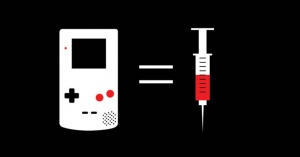User talk:Chijim
Game addiction is a mental disorder characterized by 1) intense feelings of pleasure and guilt when playing the game, 2) obsession about the game even when not playing, 3) interference with social, family, and work life, 4) anger or other signs of withdrawal when prevented from playing the game, and 5) an uncontrollable feeling to play the game. [1] It can apply to people who play either or both video and computer games.
Contents
Game addiction as a disorder
The APA's viewpoint
Game addiction is not recognized as a formal mental pathology in the DSM. In 2007, the American Psychiatric Association reviewed whether they should include "game addiction" as part of the DSM 2012, but rejected the idea, saying that there is not conclusive evidence to support that it is truly a mental disorder. [2]
The public viewpoint
Although not recognized as a formal disorder, there is an increasing amount of concern in the public about the negative effects of excessive gaming. There are also more researchers conducting surveys and experiments to find out more about the possible disorder.
Media Coverage
2011: the National Geographic Channel aired an episode of Taboo on the topic of addiction.
The show specifically focused on children in Korea, who are put into a government-funded rehabilitation center (The Internet Rescue School) for a 12-day program. The first 2-3 days are typically spent in denial, where the children insist that they are not addicted to the Internet or online gaming. However over the program, the children engage in physical activities that will re-teach them how to interact with others face-to-face and talk with counselors to see how they can divert their attention away from online gaming to other activities. The parents also teach the parents of the children on how they can help their children end their addiction. Experts believe that the typical Korean household structure contributes to the growing "gaming epidemic." Many families in Korea only have one child, breeding the loneliness of the child. The child is able to take his mind of off the loneliness by playing and interacting with other online, in the safe confines of the home. [3]
2012: CNN
Research
Diagnosis and treatment of game addiction
Diagnosis Questionnaire
Dr. Kimberley Young, recognized as the "world's foremost cyber-psychologist," developed a questionnaire to diagnose whether a person has game addiction. The questionnaire is as follows:
1) Do you need to play (online) games with increasing amounts of time in order to achieve the desired excitement? 2) Are you preoccupied with gaming (thinking about it offline, anticipating your next online session)? 3) Have you lied the friends and family members to conceal extent of your (online) gaming? 4) Do you feel restless or irritable when attempting to cut down or stop (online) gaming? 5) Have you made repeated unsuccessful efforts to control, cut back, or stop (online) gaming? 6) Do you use gaming as a way of escaping from problems or relieve feelings of helpfulness, guilt, anxiety, or depression? 7) Have you jeopardized or lost a significant relationship, or even risked your marriage because of your (online) gaming habits? 8) Have you jeopardized a job, educational, or career opportunity because of your gaming habits?
Answering yes to any of the above indicates that a person may be addicted to games. [4]
Treatment Methods
Resources
Notable game addiction incidents
See Also
References
- ↑ National Institute on Media and the Family (2007). "Mediawise Network Parent Guide to Video Game Addiction". Mediawise. http://www.scribd.com/doc/36493903/Video-Game-Addiction
- ↑ Tanner, Lindsey (22 June 2007). "Is video-game addiction a mental disorder?". Associated Press. http://www.msnbc.msn.com/id/19354827/
- ↑ Taboo. "Gaming Addiction". The National Geographic Channel. http://channel.nationalgeographic.com/channel/taboo/videos/gaming-addiction/
- ↑ Young, Kimberley. 2010. "Signs of Internet Addiction." The Center for Internet Addiction. http://www.netaddiction.com/
